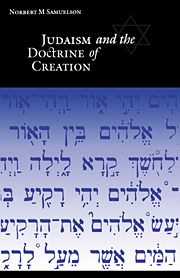Introduction
Published online by Cambridge University Press: 08 January 2010
Summary
The topic of this book is “creation.” It breaks down into discussions of two distinct, but interrelated, questions: What does the universe look like, and what is its origin? Answers to the first belong to “cosmology,” and answers to the second to “cosmogony.” Responses to both questions necessarily are speculative, since, in principle, there is no way to base an answer on direct experience. All human beings are part of the universe in both time and space. With respect to time, there always was a time before and there always will be a time after what anyone can experience. Similarly with respect to space, everyone is located within the universe. Hence, there is no vantage point from which anyone can see how the universe began or what the universe as a whole looks like. The best we can do is use what we know to infer answers to both questions about creation. Yet, there is no reason why there should be any legitimacy to this logical move. The universe may have been entirely different at its origin than it became afterwards. Similarly, the characteristics of the universe as a whole may be entirely different from the characteristics of any of its parts. Consequently, no answers to questions about creation can be called “knowledge.” At best they are “good stories,” i.e., imaginative and/or informed opinions.
The opinions about creation to be considered in this book come from the Hebrew scriptures, Greek philosophy, Jewish philosophy and contemporary physics. As such the perspective in this work is Jewish, liberal and philosophical.
- Type
- Chapter
- Information
- Judaism and the Doctrine of Creation , pp. 1 - 22Publisher: Cambridge University PressPrint publication year: 1994



